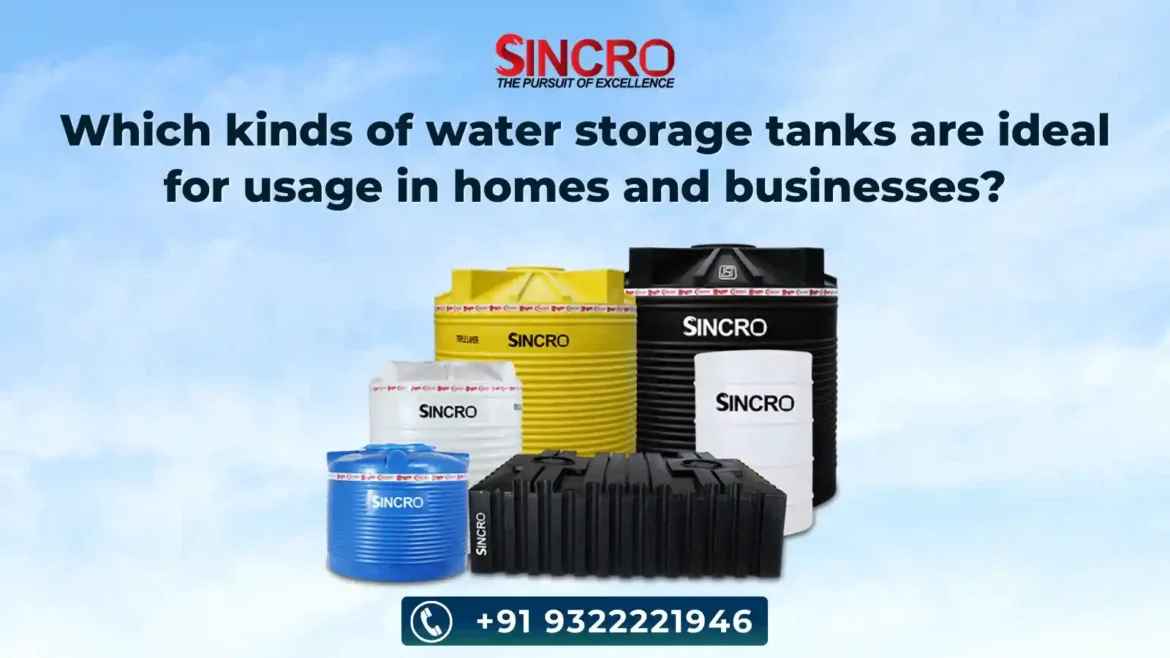Water storage tanks play a critical role in ensuring the availability of clean water for various purposes. They are particularly essential for reverse osmosis or other treatment systems, as they provide a means of storing treated water for future use.
Water storage tanks are available in a wide range of designs, sizes, and specifications, and they can be used in different settings, including residential, commercial, and large-scale industrial or municipal enterprises.
Depending on their type, water storage tanks can either be pressurized or atmospheric. Pressurized tanks are designed to deliver water on demand and do not require a booster pump to provide pressure.
In contrast, atmospheric tanks require a booster pump to provide pressure, making them suitable for applications where water needs to be transported over long distances or up to higher elevations.
When choosing a water storage tank, several factors must be considered, including the intended use, available space, required capacity, and the environmental conditions of the installation site.

Additionally, the type of material used in the construction of the tank is an important consideration, as it can affect the durability and lifespan of the tank.
In this article, you will find answers to some of the commonly asked questions about water storage tanks, which will help you understand the importance of these tanks and how to choose the right one for your needs.
Different Types of Storage Tanks for Home and Businesses
1. Polyethylene Tanks
Polyethylene tanks offer a versatile and cost-effective solution for water storage needs in both residential and commercial settings.
Sincro‘s polyethylene tanks are versatile, affordable, and durable, perfect for storing water in homes and businesses. They are made of lightweight plastic and come in various sizes and shapes. These tanks are easy to install, require minimal maintenance, and are resistant to corrosion and UV rays.
Constructed from lightweight yet durable plastic, these tanks come in a variety of sizes and shapes to accommodate different spaces and usage requirements. Whether installed above ground, below ground, or on rooftops, polyethylene tanks are relatively easy to install and require minimal maintenance.

2. Fiberglass Tanks
Fiberglass tanks are renowned for their strength, durability, and resistance to corrosion, making them ideal for storing water and various liquids in demanding industrial environments.
Constructed from layers of fiberglass and resin, these tanks can withstand extreme temperatures, harsh chemicals, and other environmental stressors. Their customizable design allows for tailored solutions to specific storage needs, ensuring optimal performance and longevity.
Although fiberglass tanks may require a higher initial investment compared to other options, their durability and low maintenance requirements make them a cost-effective choice for businesses seeking reliable liquid storage solutions.
3. Steel Tanks
Steel tanks are prized for their robustness and ability to withstand high pressure, making them indispensable for storing large volumes of water and other liquids in commercial and industrial applications. Coated with protective materials such as epoxy or galvanized steel, these tanks offer excellent corrosion resistance and long-term durability.
While steel tanks may incur higher upfront costs and require periodic maintenance to prevent corrosion, their versatility and suitability for various applications make them a preferred choice for businesses seeking reliable liquid storage solutions.
4. Concrete Tanks
Concrete tanks are renowned for their durability and resilience, making them a popular choice for long-term water storage solutions in residential and commercial settings.
Custom-built to meet specific size and capacity requirements, these tanks offer unparalleled strength and stability, capable of withstanding extreme weather conditions and soil pressures.
The installation process may be more labor-intensive and time-consuming compared to other options, the natural insulation provided by concrete tanks helps maintain water temperature and prevents freezing, ensuring consistent performance year-round.
5. Bladder Tanks
Bladder tanks excel in maximizing space efficiency and ease of installation, making them an attractive option for residential and commercial applications with limited space availability.
Utilizing a flexible bladder housed within a rigid outer shell, these tanks expand and contract as water is pumped in or out, minimizing their footprint and maximizing usable space.
Bladder tanks require less maintenance compared to traditional tanks, periodic inspections are necessary to ensure proper functionality and prevent potential issues. Their versatility and ease of installation make them an excellent choice for temporary or permanent water storage needs.
6. Stainless Steel Tanks
Stainless steel tanks offer unparalleled hygiene, durability, and aesthetic appeal, making them an ideal choice for storing potable water in residential and commercial settings.
Resistant to corrosion, rust, and contamination, these tanks provide a safe and reliable storage solution for critical applications such as food and beverage production.
Unlike stainless steel tanks may entail a higher upfront investment, their long-term durability, low maintenance requirements, and sleek appearance justify the cost. Whether installed in homes, restaurants, or industrial facilities, stainless steel tanks provide peace of mind and assurance of water quality and safety.
Closing Phrase
So before ending this article, when considering water storage solutions for homes and businesses, versatility, durability, and efficiency are paramount. Sincro offers a comprehensive range of tanks designed to meet diverse needs, ensuring reliable water storage for both residential and commercial settings. With their commitment to quality and innovation, Sincro emerges as an ideal choice, providing peace of mind and sustainable water management solutions for all.
Frequently Asked Questions
1. Which water storage tanks does Sincro recommend for home use?
Sincro suggests plastic water storage tanks for homes due to their durability, lightweight design, and cost-effectiveness, ensuring safe and clean water storage.
2. What type of commercial water storage tanks does Sincro offer?
Sincro offers large-capacity overhead and underground water storage tanks for businesses, ensuring reliable water supply for various commercial needs.
3. Are Sincro water storage tanks safe for drinking water?
Yes, Sincro’s water storage tanks are made from food-grade, UV-stabilized materials, keeping drinking water safe, hygienic, and free from harmful contaminants.
4. Does Sincro provide customized water storage tank solutions?
Sincro offers customized water storage tank solutions to match specific residential or commercial requirements, ensuring perfect fit and optimal performance.
5.Why choose Sincro’s plastic water storage tanks over metal tanks?
Sincro’s plastic tanks resist rust, corrosion, and algae growth, unlike metal tanks, offering longer life, easy maintenance, and safe water storage for all needs.





